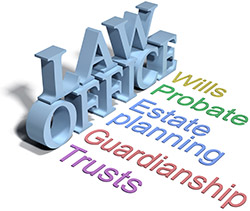|
|
Estate Planning
Monday, November 16, 2015

Most people develop an estate plan as a way to transfer wealth, property and their legacies on to loved ones upon their passing. This transfer, however, isn’t always as seamless as one may assume, even with all of the correct documents in place. What happens if your eldest son doesn’t want the family vacation home that you’ve gifted to him? Or your daughter decides that the classic car that was left to her isn’t worth the headache?
When a beneficiary rejects a bequest it is technically, or legally, referred to as a "disclaimer." This is the legal equivalent of simply saying "I don't want it." The person who rejects the bequest cannot direct where the bequest goes. Legally, it will pass as if the named beneficiary died before you. Thus, who it passes to depends upon what your estate planning documents, such as a will, trust, or beneficiary form, say will happen if the primary named beneficiary is not living.
Now you may be thinking why on earth would someone reject a generous sum of money or piece of real estate? There could be several reasons why a beneficiary might not want to accept such a bequest. Perhaps the beneficiary has a large and valuable estate of their own and they do not need the money. By rejecting or disclaiming the bequest it will not increase the size of their estate and thus, it may lessen the estate taxes due upon their later death.
Another reason may be that the beneficiary would prefer that the asset that was bequeathed pass to the next named beneficiary. Perhaps that is their own child and they decide they do not really need the asset but their child could make better use of it. Another possible reason might be that the asset needs a lot of upkeep or maintenance, as with a vacation home or classic car, and the person may decide taking on that responsibility is simply not something they want to do. By rejecting or disclaiming the asset, the named beneficiary will not inherit the "headache" of caring for, and being liable for, the property.
To avoid this scenario, you might consider sitting down with each one of your beneficiaries and discussing what you have in mind. This gives your loved ones the chance to voice their concerns and allows you to plan your gifts accordingly.
Monday, November 2, 2015

The conversation about a person’s last wishes can be an awkward one for both the individual who is the topic of conversation and his or her loved ones. The end of someone’s life is not a topic anyone looks forward to discussing. It is, however, an important conversation that must be had so that the family understands the testator’s final wishes before he or she passes away. If a significant sum is being left to someone or some entity outside of the family, an explanation of this action may go a long way to avoiding a contested will. In a similar vein, if one heir is receiving a larger share of the estate than the others, it is prudent to have this action explained. If funds are being placed in a trust instead of given directly to the heirs, it makes sense for the testator to advise his or her loved ones in advance.
When a loved one dies, people are often in a state of emotional turmoil. Each deals with grief differently and, often, unpredictably. Anger is a common reaction to loss, one of the five stages postulated to apply to everyone dealing with such a tragedy. Simply by talking to loved ones ahead of time, a testator can preempt any anger misdirected at the estate plan and avoid an unnecessary dispute, be it a small family tiff or a prolonged legal battle.
The executor of the estate must be privy to a significant amount of information before a testator passes on. It is helpful for the executor to know that he or she has been chosen for this role and to have accepted the appointment in advance. The executor should know the location of the original will. Concerns of fraud mean that only the original copy of a will can be entered into probate. The executor should be aware of all bank accounts, assets, and debts in a testator’s name. This will avoid a tedious search for documents after the decedent passes on and will ensure that all assets are included as part of the estate. The executor of an estate should be aware of all memberships, because it will be the executor’s responsibility to cancel them. An up-to-date accounting of all assets and debts will simplify the settlement of the estate for an executor significantly.
Monday, October 26, 2015

An executor's fee is the amount charged by the person who has been appointed as the executor of the probate estate for handling all of the necessary steps in the probate administration. Therefore, if you have been appointed an executor of someone’s estate, you might be entitled to a fee for your services. This fee could be based upon a variety of factors and some of those factors may be dependent upon state, or even local, law.
General Duties of an Executor
- Securing the decedent's home (changing locks, etc.)
- Identifying and collecting all bank accounts, investment accounts, stocks, bonds and mutual funds
- Having all real estate appraised; having all tangible personal property appraised
- Paying all of the decedent’s debts and final expenses
- Making sure all income and estate tax returns are prepared, filed and any taxes paid
- Collecting all life insurance proceeds and retirement account assets
- Accounting for all actions; and making distributions of the estate to the beneficiaries or heirs.
This list is not all-inclusive and depending upon the particular estate more, or less, steps may be needed.
As you can see, there is a lot of work (and legal liability) involved in being the executor of an estate. Typically the executor would keep track of his or her time and a reasonable hourly rate would be used. Other times, an executor could charge based upon some percent of the value of the estate assets. What an executor may charge, and how an executor can charge, may be governed by state law or even a local court's rules. You also asked whether the deceased can make you agree not to take a fee. The decedent can put in his or her will that the executor should serve without compensation but the named executor is not obligated to take the job. He or she could simply decline to serve. If no one will serve without taking a fee, and if the decedents will states the executor must serve without a fee, a petition could be filed with the court asking them to approve a fee even if the will says otherwise. Notice should be given to all interested parties such as all beneficiaries.
If you have been appointed an executor or have any other probate or estate planning issues, contact us for a consultation today.
Monday, October 19, 2015

A life estate is a special designation in probate law referring to a gift to a family member that lasts as long as the life of the recipient. If an individual uses a life estate as part of his or her estate plan, whatever is bequeathed under the life estate will revert back to the residual estate upon the death of the life estate recipient. It is most common in scenarios where an individual starts a new family without children later in life and wants to ensure that the present spouse is taken care of for the remainder of her or his life. The owner of a life estate is called a life tenant. A life estate is often used as an alternative to a trust because it provides the life tenant with more control over the transferred asset.
A life tenant may treat an asset as his or her own. A home may be rented to tenants for income. The life tenant may sell his or her interest in the property to the heirs of the residual estate or to third parties. If the property is sold to a third party, that third party must surrender the property to the residual heirs upon the death of the life tenant.
Though the property belongs to the life tenant, the life tenant has a duty to the residual heirs to keep the property reasonably maintained and in good condition. He or she has an obligation to avoid mortgage arrearages and tax liens while in possession of the property. Exploiting natural resources on the property may be restricted during a life tenancy. A life tenant may not bequeath his or her interest in a life estate through a will because that interest immediately terminates upon the life tenant’s death. Significant changes to the property need to be agreed upon by all parties.
Though there are benefits, there are also drawbacks to establishing a life estate as part of an estate plan. The action could create estate tax issues for the tenant’s estate. In addition, creditors of the tenant may attach liens on the property, creating complicated legal issues for the heirs of the residual estate.
Monday, October 5, 2015

Estate planning is designed to fulfill the wishes of a person after his or her death. Problems can easily arise, however, if the estate plan contains unanswered questions that can no longer be resolved after the person's demise. This can, and frequently does, lead to costly litigation counter-productive to the goals of the estate. It is important that will be written in language that is clear and that the document has been well proofread because something as simple as a misplaced comma can significantly alter its meaning.
Planning for every possible contingency is a significant part of estate planning. Tragic scenarios in which an estate planner’s loved ones predecease him or her, though uncomfortable, must be considered during the preparation of a will to avoid otherwise unforeseen conflicts.
Even trained professionals can make significant mistakes if they are not well versed in estate planning. An attorney who practices general law, while perfectly capable of preparing simple wills, may not understand the intricacies of trusts and guardianships. A great many attorneys, not aware of the tax consequences of bequests involving IRAs, may leave heirs with unnecessary financial obligations. If an attorney is not knowledgeable enough to ask the proper questions, he or she will be unable to prepare an estate plan that functions efficiently and ensures the proper distribution of the estate's assets.
In spite of the wealth of an individual, the estate may be cash deficient if that wealth is tied up in assets at the time of the individual's death. Problems can also result if an estate planner has distributed assets into joint bank accounts or accounts with pay on death provisions. If the executor of the estate does not have access to funds to pay the estate's bills or taxes, the heirs of the estate may run into trouble.
Even if estate planning is handled well from a logistical point of view, lack of communication with loved ones can interfere with a will's desired execution. A tragedy that incapacitates the testator can occur suddenly, so it is imperative that a savvy estate planner confers with loved ones as soon as possible, making them aware of any future obligations, such as life insurance premiums that must be paid and informing them of the location of any probate documents and inventories of assets. Such conversations ensure that the individual's wishes will be carried out without complications or delay in the event of an unexpected incapacity.
In addition to communicating logistical information, it is also essential to schedule a personal conversation with loved ones that makes clear any sentimental bequests or large gifts that require explanation. This avoids the shock or discomfort that may arise after one's death during which a well-thought-out decision is questioned as impulsive or irrational. Such direct communication of one's plans avoids unnecessary envy, arguments or rivalry among family and friends.
Consulting with attorneys who specialize in estate planning is the cornerstone of creating a plan to ensure that one's desires are carried out and that all the bases are covered. Estate planning attorneys serve as invaluable repositories of all information necessary to strategizing a plan that not only meets one's personal needs and desires, but is legally binding.
Monday, September 28, 2015

How can I control my assets after death?
The practice of estate planning is dedicated to preserving an individual’s control over his or her assets after death. A simple will can control which individuals receive what assets, but a more thorough plan has the potential to do much more. Establishing a trust is the most common method used to exercise this kind of control.
A trust can issue a bequest restricted by a condition; for example, a trust might be established to pay out $10,000.00 to a specific grandchild only once he or she has reached 18 years of age. Multiple payments can be made to the beneficiaries as long as the trust is funded. The trust can stipulate that the grandchild may have to graduate from college to receive the money, or even that he or she must graduate from a specific school with a minimum grade-point average or membership in a particular fraternity or sorority.
A trust can make the condition of payment as specific or as broad as the creator of the trust wishes. It may, for instance, bequeath benefits to a humanitarian organization on condition that the organization continues to provide food and shelter to the homeless. There is no limit to the number of conditions permissible in a trust document. Even when the conditions go against public policy and general norms and mores established by society, as long as the conditions may be met legally, they will be upheld by the court.
In order to create a trust, there must be a capital investment to fund it and a trustee must be named. The trustee is responsible for protecting the assets of the trust, investing them to the best of his or her ability, managing real estate and other long-term assets, interpreting the trust document, communicating regularly with the beneficiaries of the trust and performing all of these actions with a high level of integrity. Trust assets may be used to pay for expenses of managing the trust as well as to provide a stipend for the trustee if so provided for in the trust document.
If a trust document is not well written, it may be the target of a lawsuit seeking to dissolve the trust and disburse the assets held therein. Even if the trust is defended successfully, the costs of this challenge may deplete its coffers and frustrate the very reason for its creation. In order to avoid these possible pitfalls, it is imperative that a trust document be drafted by an attorney with a high degree of experience in estate planning law.
Monday, September 14, 2015

Will - a written document specifying a person’s wishes concerning his or her property distribution upon his or her death.
In order to be enforced by a court of law, a will must be signed in accordance with the applicable wills act.
Testator/Testatrix - the person who signs the will.
Heirs - beneficiaries of an estate.
Executor/Executrix - the individual given authority by the testator to make decisions to put the testator’s written directions into effect.
Once the will is entered into probate, the executor’s signature is equivalent to the testator’s. The executor has a legal duty to the heirs of the estate to act in the best interest of the estate, and may collect a fee for performing such service.
Administrator/Administratrix - the person who assumes the role of the executor when a person dies without a will (intestate).
The Administrator must apply with the local probate office and may be required to provide a bond to be held in escrow as collateral for control over the assets of the estate.
Codicil - an amendment to a will.
In order to be valid, a codicil must comply with all the requirements of the applicable wills act.
Holographic Will- a handwritten will.
Holographic wills are often exempt from requirements of the applicable wills act.
Bequest - a gift given by the testator to his or her heirs through a will.
Residual Estate - the balance of a testator’s belongings after debts have been paid and specific bequests have been distributed.
Intestate - not having signed a will before one dies; a person who dies without having signed a will.
Life Estate - a bequest that gives an heir the right to have exclusive use of a property for the remainder of his or her life, but without the power to transfer such property upon the death of that heir.
The property will transfer to the heirs of the residual estate after the death of the beneficiary of the life estate.
Per stirpes - a Latin phrase precisely translated as “by the branch” meaning that, if an heir named in the will dies before the testator, that heir’s share will be divided equally among that beneficiary’s own heirs.
An alternative to per capita, described below.
Per capita - a Latin phrase precisely translated as “by the head” meaning that, if an heir named in the will dies before the testator, that heir’s share will be divided among the testator’s remaining heirs.
An alternative to per stirpes, described above.
While it is a good idea to have a basic understanding of fundamental estate planning vocabulary, this cannot serve as a substitute for the services of an experienced attorney.
Monday, September 7, 2015

This question presents a fairly common issue posed to estate planning attorneys. The solution is also pretty easy to address in your will, trust and other estate planning documents, including any guardianship appointment for your minor children.
First, its important to note that you should not delay establishing an estate plan pending the birth of a new child. In fact, if your planning is done right you most likely will not need to modify your estate plan after a new child is born. The problem with waiting is that you cannot know what tomorrow will bring and you could die, or become incapacitated and not having any type of plan is a bad idea.
In terms of how an estate plan can provide for “after-born” children, there are a few drafting techniques that can address this issue. For example, in your will, it would refer to your current children typically by name and their date of birth. Then, your will would provide that any reference to the term "your children" would include any children born to you, or adopted by you, after the date you sign your will.
In addition, in the section or article of your will that provides how your estate and assets will be divided, it could simply provide that your estate and assets will be divided into separate and equal shares, one each for "your children." That would mean that whatever children you have at the time of your death would receive a share and thus the will would work as you intend, even if you did not amend it after having a new child.
On a side note, you should make certain that your plan does not give the children their share of your estate outright while they are still young. Rather, your will or living trust should provide that the assets and money are held in a trust structure until they are reach a certain age or achieve certain milestones such as college graduation or marriage. Any good estate planning attorney should be able to advise you about this and help walk you through the various options you have available to you.
Thursday, August 6, 2015

There are certain considerations that should be kept in mind for those with chronic illnesses. Before addressing this issue, there should be some clarification as to the definition of "chronically ill." There are at least two definitions of chronically ill. The first is likely the most common meaning, which is an illness that a person may live with for many years. Diseases such as diabetes, cardiovascular disease, lupus, multiple sclerosis, hepatitis C and asthma are some of the more familiar chronic illnesses. Contrast that with a legal definition of chronic illness which usually means that the person is unable to perform at least two activities of daily living such as eating, toileting, transferring, bathing and dressing, or requires considerable supervision to protect from crisis relating to health and safety due to severe impairment concerning mind, or having a level of disability similar to that determined by the Social Security Administration for disability benefits. Having said all of that, the estate planning such a person may undertake will likely be similar to that of a healthy person, but there will likely be a higher sense of urgency and it will be much more "real" and less "hypothetical."
Most healthy individuals view the estate planning they establish as not having any applicability for years, perhaps even decades. Whereas a chronically ill person more acutely appreciates that the planning he or she does will have real consequences in his or her life and the life of loved ones. Some of the most important planning will center around who the person appoints as his or her health care decision maker and also who is appointed to handle financial affairs. a will and/or revocable living trust will play a central role in the person's planning as well. Care should also be taken to address possible Medicaid planning benefits. A consultation with an estate planning and elder law attorney is critical to ensuring all necessary planning steps are contemplated and eventually implemented.
Wednesday, July 29, 2015
 If you are about to begin the estate planning process, you have likely heard the term "funding the trust" thrown around a great deal. What does this mean? And what will happen if you fail to fund the trust? If you are about to begin the estate planning process, you have likely heard the term "funding the trust" thrown around a great deal. What does this mean? And what will happen if you fail to fund the trust?
The phrase, or term, "funding the trust" refers to the process of titling your assets into your revocable living trust. A revocable living trust is a common estate planning document and one which you may choose to incorporate into your own estate planning. Sometimes such a trust may be referred to as a "will substitute" because the dispositive terms of your estate plan will be contained within the trust instead of the will. A revocable living trust will allow you to have your affairs bypass the probate court upon your death, using a revocable living trust will help accomplish that goal.
Upon your death, only assets titled in your name alone will have to pass through the court probate process. Therefore, if you create a trust, and if you take the steps to title all of your assets in the name of the trust, there would be no need for a court probate because no assets would remain in your name. This step is generally referred to as "funding the trust" and is often overlooked. Many people create the trust but yet they fail to take the step of re-titling assets in the trust name. If you do not title your trust assets into the name of the trust, then your estate will still require a court probate.
A proper trust-based estate plan would still include a will that is sometimes referred to as a "pour-over" will. The will acts as a backstop to the trust so that any asset that is in your name upon your death (instead of the trust) will still get into the trust. The will names the trust as the beneficiary. It is not as efficient to do this because your estate will still require a probate, but all assets will then flow into the trust.
Another option: You can also name your trust as beneficiary of life insurance and retirement assets. However, retirement assets are special in that there is an "income" tax issue. Be sure to seek competent tax and legal advice before deciding who to name as beneficiary on those retirement assets.
Monday, July 6, 2015
5526.jpg) Estate planning is a powerful tool that among other things, enables you to direct exactly how your assets will be handled upon your death or disability. A well-crafted estate plan will ensure you and your family avoid the hassles of guardianship, conservatorship, probate or unpleasant estate tax surprises. Unfortunately, many individuals have fallen victim to several persistent myths and misconceptions about estate planning and what happens if you die or become incapacitated. Estate planning is a powerful tool that among other things, enables you to direct exactly how your assets will be handled upon your death or disability. A well-crafted estate plan will ensure you and your family avoid the hassles of guardianship, conservatorship, probate or unpleasant estate tax surprises. Unfortunately, many individuals have fallen victim to several persistent myths and misconceptions about estate planning and what happens if you die or become incapacitated.
Some of these misconceptions about living trusts and wills cause people to postpone their estate planning – often until it is too late. Which myths have you heard? Which ones have you believed?
Myth: I’m not rich so I don’t need estate planning.
Fact: Estate planning is not just for the wealthy, and provides many benefits regardless of your income or assets. For example, a good estate plan includes provisions for caring for a minor or disabled child, caring for a surviving spouse, caring for pets, transferring ownership of property or business interests according to your wishes, tax savings, and probate avoidance.
Myth: I’m too young to create an estate plan.
Fact: Accidents happen. None of us knows exactly when we will die or become incapacitated. Even if you have no assets and no family to support, you should have a power of attorney and health care directive in place, in case you ever become disabled or incapacitated.
Myth: Owning property in joint tenancy is an easier, more affordable way to avoid probate than placing it in a revocable living trust.
Fact: It is true that property held in joint tenancy will pass to the other owner(s) outside of the probate process. However, it is a usually a very bad idea. Placing property in joint tenancy constitutes a gift to the joint tenant, and may result in a sizable gift tax being owed. Furthermore, once the deed is executed, the property is legally owned by all joint tenants and may be subject to the claims of any joint tenant’s creditors. Transferring a property into joint tenancy is irrevocable, unless all parties consent to a future transfer; whereas property owned in a living trust remains under your control and the transfer is fully revocable until your death.
Myth: Keeping property out of probate saves money on federal estate taxes.
Fact: Probate, and probate avoidance, are governed by state law and address how property passes upon your death; they have nothing to do with federal estate taxes, which are set forth in the Internal Revenue Code. Estate planning can reduce estate taxes, but that has nothing to do with a discussion regarding probate avoidance.
Myth: I don’t need a living trust if I have a will.
Fact: A properly drafted trust contains provisions addressing what happens to your property if you become incapacitated. On the other hand, a will only becomes effective upon your death and specifies who will inherit the property. If you own real property, or have more than $100,000 in assets, both a will and a living trust are generally recommended.
Myth: With a living trust, a surviving spouse need not take any action after the other spouse’s death.
Fact: Failure to adhere to the proper legal formalities following a death could result in significant administrative and tax implications. While a properly drafted and funded living trust will avoid probate, there are still many tasks that have to be performed such as filing documents, sending notices and transferring assets.
Law Offices of Mary P. Kulvinskas located in Westlake Village, CA serves clients in southern CA including Agoura, Calabasas, Camarillo, Los Angeles, Malibu, Oxnard, Simi Valley, Thousand Oaks, San Fernando Valley, and Ventura.
|
|
 |
|